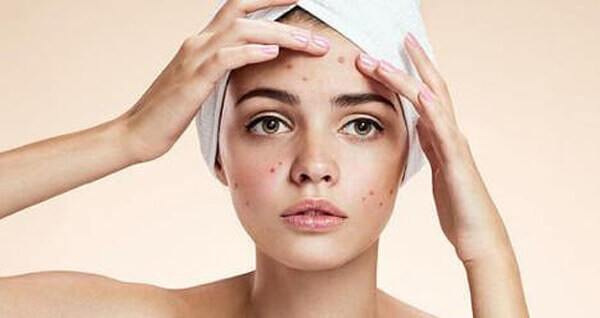"It’s just hormones, you’ll grow out of it”. Anyone who has acne has probably heard this before. But are hormones really the only one to blame when you have acne? While, hormones play a significant part in the development of acne, there are other factors that can cause acne.

Your face is covered in pores, tiny holes that are openings to follicles. Each follicle is made up of one hair and one sebaceous gland. Sebaceous glands produce sebum (oil) that travel up the hair and onto the skin. Sebum is a naturally produced oil that has two main functions. First, it acts as a waterproof barrier, protecting too much water from entering or exiting the skin. Second, sebum guards against undated bacteria, fungus and other pollutants from entering the skin. Unfortunately, there is a delicate balance between sebum and your skin. Too little and your skin can feel dry and flaky, too much and your pores become clogged. A pimple is present when sebum cannot escape the pore, and bacteria is present, and if a persons is repeatedly experiencing pimples or “zits”, they may have acne.
The most common form of pimples are “whiteheads” or “blackheads”; both are considered comedones (small, skin-coloured bumps). Whiteheads are closed to the surface, not exposing the puss or bacteria to oxygen, so they remain white in colour. Blackheads are open to the surface, allowing oxygenation of the puss/bacteria causing the appearance to be black in colour. Other lesions that can appear in acne suffers include:
Acne can be defined as an increase in cellular proliferation and sebum production, often initiated by a hormonal flux. Acnenic skin conditions are categorized as either inflamed or non-inflamed. With non-inflamed acne there is no redness or swelling of lesions, and it is characterized but ductal plugging, blackheads, congestion and microcondones. Inflammation occurs as the body’s response to a break in the follicle wall. Redness, swelling, cysts, nodules, pustules, papule and white and blackhead congestion is present, and is often quite painful.
Acne occurs when there is disharmony in one or more ways in the sebum release process.
Our body tries to balance our hormones in order to function at it’s best; however, it doesn’t always win the battle. Unfortunately, during puberty and pregnancy when our hormones are fluctuating, many people experience acne. This is mainly a result of an excesses of testosterone. In response to the excess of testosterone, the body tries to get rid of it, by flushing it through the pores, by increasing sebum production. Testosterone also effects the development of skin cells that line the follicle, further contributing to build up and congestion in the pores.
Unfortunately, if acne runs in your family there is a higher chance that’ll you’ll experience the same. We inherit our genes from our parents. Our genes influence how sensitive our bodies and therefore our skin is to hormones. Testosterone present in someone with parents who did not have acne will have little to no effect on their skin’s sebum production; while, the same level present in someone with acne-prone skin will result in an over-proliferation of sebum and ultimately acne. Genetics also influences your skin’s inflammatory response to unwanted bacteria, especially P. acnes bacteria. Acne suffers often have a significantly increased inflammatory response to P. acnes bacteria, and other minor assaults. In turn, genes also effect the production of anti-inflammatory chemicals within the skin.
While, doctors are not 100% sure of the mechanisms that cause acne to occur in overly-stressed people or worsen already present acne, but they do recognize the correlation. They do know that sebum producing glands do contain stress hormone receptors, that could be stimulated when they are in contact with the hormones released during times of stress (cortisol and adrenaline).
Pollution is made up of chemicals in our environment that are so small they can easily fit inside the pores on your skin. A build up of these chemicals can easily clog the follicle shaft and pore, harbouring bacteria and preventing sebum from being released. Toxins and other pollutants can enter the body in many ways, but as the skin is the bodies largest organ of elimination, they are often released through the pores, further resulting in congestion.
Regardless of what causes acne, for those who suffer from it, it can be an absolutely debilitating nightmare. While there are several ways to try and manage acne, the two most common ingredients used topically are Benzoyl Peroxide (BP) and Salicylic acid. DMK incorporates both in the fight against acne. Check out the products below that we recommend if you have acne, or just suffer from the occasional pimple.